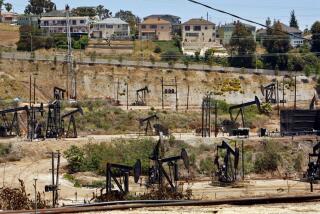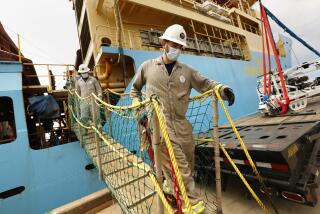A closer look at deep-water drilling
- Share via
Reporting from Washington — The explosion and sinking of the Deepwater Horizon drilling rig have thrown a spotlight on the challenges and risks of deep-water drilling.
President Obama has declared a six-month moratorium on drilling new deep-water wells, which proliferated in the last decade as drilling technology advanced and returns from traditional, shallower domestic wells diminished.
Administration officials say the pause will allow them time to hear from a newly appointed presidential commission and to reevaluate safety regulations and other federal oversight. “With the BP oil spill still growing in the gulf, and investigations and reviews still underway, a six-month pause in drilling is needed, appropriate and prudent,” Interior Secretary Ken Salazar said last month.
Here’s a rundown of deep-water drilling’s place in the nation’s energy mix.
What counts as “deep-water” drilling, and how much of it is there?
For purposes of the moratorium, the federal government classifies any drilling in depths beyond 500 feet as “deep.” By that definition, there are about 600 deep-water wells in the Gulf of Mexico.
They produce about 80% of the oil and 45% of the natural gas coming from the gulf, according to the Louisiana Mid-Continent Oil and Gas Assn., an industry group. As a share of total U.S. oil use, however, the deep wells’ contribution is just a few drops in the bucket.
What are the risks of drilling at those depths?
As the Deepwater Horizon disaster has shown, the biggest one is access. The water pressure so far below the surface makes it impossible for human divers to reach. So if a well blows out or experiences some other calamity, responders must use remote-controlled robots to try to fix it.
It’s increasingly clear that oil companies and the federal government added to the risks of a catastrophic spill by not devising detailed, adequate plans to plug a blowout in deep water — essentially leaving them to invent response strategies.
Will the federal moratorium stop all deep-water drilling for now?
The moratorium applies only to new wells. Current deep-water production in previously drilled wells will continue. But the government action will essentially freeze 33 deep-water rigs in the gulf that were poised to drill. The Louisiana industry group reports that each of those rigs employs 90 to 140 people at any given time, which means between 2,970 and 4,620 jobs are directly affected by the moratorium.
More to Read
Sign up for Essential California
The most important California stories and recommendations in your inbox every morning.
You may occasionally receive promotional content from the Los Angeles Times.













